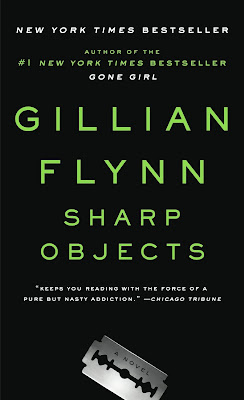One of the greatest gifts that Gillian Flynn has a writer is knowing how to make the nasty appealing. In one of her earliest novels, "Sharp Objects" reflects a woman's complicated journey with family whose tensions are resurrected when she's forced to return to her hometown. Despite being an investigative reporter who is used to difficult subject matters, there is something about this particular case that bothers her on a deep level. It could be because of how it drags up unhealthy coping behaviors as harsh comments lead her to potentially relapse. As everything falls apart, the novel becomes of the most perplexing views of self-harm that 21st century fiction has provided. Even in its sensationalized approach, Flynn doesn't romanticize the condition. Instead it becomes a character study that takes familiar tropes and makes for a pulpy page-turner that does enough right to foreshadow one of fiction's most impressive young careers to date.
Like all good murder myteries, the protagonist starts this journey looking in from the outside. She has seen her fair share of cases, but there is something about this one that draws her in. She feels a connection with a young murdered woman whose home life was unpleasant. The one catch is that she has to return to her hometown and deal with a society that she felt ostracized by. Everyone has their own harmful behavior that will swallow everyone alive. Flynn writes them like the catty high school gossips who know which buttons to press. As she does, there is this fourth-wall breaking technique that makes it look like the taunts are directed at the reader, making the tensions worse as the story develops into an engrossing, shocking third act that is not without a masterful execution.
If the novel has any notorious element, it's discussion of self-harm. The most noteworthy kind is the scarring of flesh with various words that symbolize different ideas. Flynn recognizes that it is an addiction and never seeks to make the behavior appealing. Instead it's a study of psychosis that makes one wonder what draws anyone to the behavior. There is something tragic within the sensationanlized prose. Among the endless cruelty and self-destructive tendencies is a search for reason to keep living. It's suffocating and makes it difficult for the reader to trod along. The constant curiosity to reread passages because of how odd certain details are only show how dedicated Flynn is to the vision. She knows how to mine emotion out of a traditional dysfunctional family drama and really nails the big moments necessary to make it borderline melodrama.
While "Gone Girl" may be a more perfectly executed caper, "Sharp Objects" has enough heart in its purpose to reward readers. It may require overcoming squeamish mentalities and pushing past the grotesque, but what one finds is humanity needing to be expressed. These people suffering only want to be loved, and the animosity only makes it harder to believe it will be found. Flynn may appear nihilistic at times, but there's no denying that she's searching for the relief in tragedy. It helps that her characters have a functionality that keeps them from being total victims. There is a push to endure, and that's how the trashiness lives alongside something more sincere and genuine. It's difficult to forget characters like this if just because of how aggressively she describes them on the page. There is a need for them to be loved and, in place of anyone in their world, she allows them to be in the reader's.

No comments:
Post a Comment